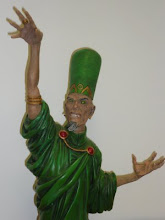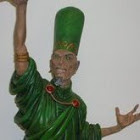 A great collection of stories, some supernatural, some crime and others from a unjustly neglected English writer. The mix of stories is very nicely judged by the editor David Stuart Davies, they show the breath of W.F. Harvey's writing. From the supernatural stories in the collection, the title story is a very enjoyable and straightforward story of a supernatural menace. The tension is nicely created and swiftly built upon, the climax sharp and to the point. A much more oblique story, "August Heat" uses a technique that W.F. Harvey liked, the conclusion is left strongly implied rather than delivered. The reader is not cheated, the climax is the least aspect of the story, the careful set up is the reason and it is done with such care and skill that it can carry off an open conclusion.
A great collection of stories, some supernatural, some crime and others from a unjustly neglected English writer. The mix of stories is very nicely judged by the editor David Stuart Davies, they show the breath of W.F. Harvey's writing. From the supernatural stories in the collection, the title story is a very enjoyable and straightforward story of a supernatural menace. The tension is nicely created and swiftly built upon, the climax sharp and to the point. A much more oblique story, "August Heat" uses a technique that W.F. Harvey liked, the conclusion is left strongly implied rather than delivered. The reader is not cheated, the climax is the least aspect of the story, the careful set up is the reason and it is done with such care and skill that it can carry off an open conclusion."The Man Who Hated Aspidistras" is more of a sliver than a story, it is not even an anecdote, still it slyly satisfying as a slightly bitter joke. on the other hand "The Fern" is savagely bitter, beautifully paced and the biting open conclusion offers no refuge for the cast or the reader. To show off his astonishing variety "The Angel of Stone" manages in three pages to remind the cast and reader that time is precious and small pleasures are among its greatest joys.
One of the stand out stories in the book is "A Middle-Class Tragedy", with a cruel economy and precision it skewers its leading character. The writing is beautiful, not a word is out of place, the conclusion is heartbreaking in its entirely justified smallness. A section in the book is titled "Twelve Strange Cases", these are stories narrated by a middle-aged nurse and are about some of the cases she has attended at. The greatest pleasure in these stories, each of which has a clever plot, fully realised and with very well judged reveals, is the narrator herself. Her personality sparkles off the page, she draws the reader in with the pleasure in the storytelling. She is given enough space to emerge as a serious, competent, curious and forceful personality. This is critical as the stories work because she is such a strong character, the plots draw their force because of her strength. The stories moreover are peppered with her salty observations on her patients, fellow nurses and hospitals, she has a cheerfully biting turn of phrase.
All in all this is a really enjoyable collection of stories, a pleasure to read.


No comments:
Post a Comment